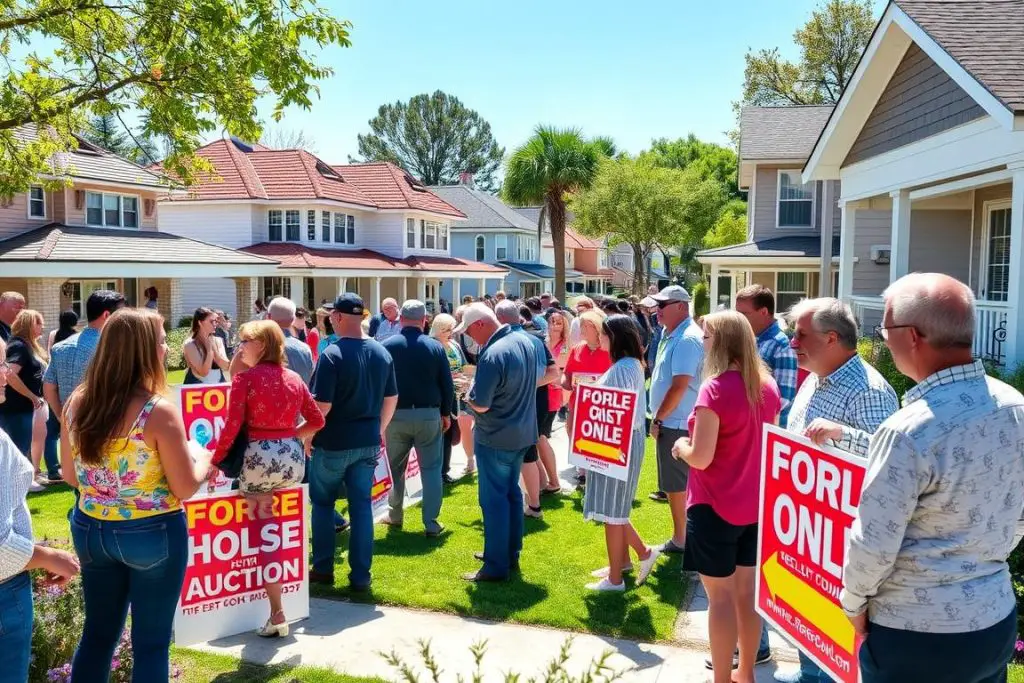Missed Mortgage Payments? Here’s How to Navigate Foreclosures and Find Affordable Housing

In the American dream of owning a home, sometimes things don’t go as planned. Unexpected problems can lead to missed mortgage payments. But there’s hope. Exploring foreclosures can help you find affordable homes and regain your financial stability. This gives you a chance to find good deals on properties that banks own.
Facing missed payments can feel overwhelming, but you’re not alone. There are ways to avoid foreclosure and find great deals. The market has many options, from under-the-radar homes to bank-owned properties. Let this guide be your map. It will help you navigate through the challenges of foreclosure towards affordable housing.
Key Takeaways
- Understand available options when facing missed mortgage payments.
- Recognize the potential of investing in distressed properties and bank-owned homes.
- Learn strategies to navigate real estate foreclosure and secure deals.
- Embrace the process, knowing it can lead to affordable housing solutions.
- Stay informed to make the best decisions during financial hardships.
Understanding Foreclosure and Your Rights as a Homeowner
Foreclosures can seem scary, but knowing your rights helps turn them into foreclosure opportunities. If you’re thinking about buying foreclosures as investment properties or searching for a new home, it’s vital to learn about the foreclosure process and your rights.
The Foreclosure Process Step-by-Step
The journey to foreclosure begins when a homeowner can’t pay their mortgage. This process has several steps, each offering chances to fix the financial trouble. First, the lender sends a notice of default. This is the start of the foreclosure process.
Then, there’s a pre-foreclosure stage. During this time, buying foreclosures can be discussed with the lender before the public auction.
Legal Rights and Protections Against Foreclosure
Your rights in a foreclosure are protected by state and federal laws. These laws stop unfair practices and let homeowners have their say. It’s key to act on all legal notices and look into options like loan changes, short sales, or refinancing. Each state offers different protections, understanding these can help in keeping your home or finding foreclosure opportunities.
Communicating with Lenders: Tips for Successful Negotiations
Talking effectively with your lender can lead to good outcomes, such as changing your loan or avoiding foreclosure. Here are some tips:
- Always communicate in writing to have a record.
- Be honest and clear about your finances and what you can pay.
- Explore solutions like missing a few payments or extending the loan period.
Being proactive in talks with lenders might also show potential investment properties if they’d rather sell before auction.
Foreclosure Opportunities: Turning Challenges into Potential Wins
Facing foreclosure challenges can open doors to valuable real estate deals. This section talks about how you can find such opportunities. You might look into pre-foreclosure listings, auctioned properties, or investment chances.
Exploring Your Options in Pre-Foreclosure Listings
Pre-foreclosure listings can be a treasure for those looking to buy homes or invest. They show homes potentially sold for less than they’re worth because the owner is behind on payments. If you’re interested in pre-foreclosure listings, it’s crucial to research thoroughly. Check the property’s details, look at the area’s value, and understand the legal aspects.
Attending Foreclosure Auctions: A Step Towards Affordable Homeownership
Foreclosure auctions are a direct way to buy homes, where the highest bidder wins. These auctions are usually open to the public. Being prepared is key to success at foreclosure auctions. Know the rules, register ahead of time, and sort out your money matters. Quick thinking and alertness at auctions can land you a great deal.
Investment Properties: The Pros and Cons of Buying Foreclosures
Foreclosure investments can be rewarding, offering lower buying prices and high ROI. Yet, buying foreclosure deals can be risky. You might face unexpected repair costs or legal issues from past owners. It’s important to consider both the good and the bad:
- Pro: Reduced purchase prices.
- Pro: Higher potential returns.
- Con: Property may require extensive repairs.
- Con: Possible legal challenges from previous owners.
Knowing these facts can help you navigate foreclosure investments wisely.
Steps to Recover from Missed Payments and Avoid Foreclosure
Dealing with missed mortgage payments early can help stop foreclosure. You can keep your home this way. Look into loan modification, government-assisted programs, and other steps to help your finances.
Creating a Financial Contingency Plan to Manage Mortgage Debts
First, make a strong financial plan. Check your budget and what you really need to spend on. You might also want to talk to financial advisors.
Keep an eye on what you earn and spend. This helps find ways to save money, so you can pay more on your mortgage. It’s good to be ready for unexpected money problems.
Loan Modification and Refinancing: A Path to Repayment
Changing your loan terms might make payments easier to manage. This can mean making the loan time longer or cutting interest rates. Changing to a fixed interest rate is also a possibility. Refinancing for better terms can reduce what you pay each month too.
Government-Assisted Programs for Those Facing Foreclosure Risks
There are government programs that help if you’re struggling with mortgage payments. The Home Affordable Modification Program (HAMP) and the Home Affordable Refinance Program (HARP) offer help to stay in your home and prevent foreclosure. Check if you qualify and apply early to get the most help.
| Program | Details | Benefit |
|---|---|---|
| HAMP | Loan Modification Program | Reduces monthly payments to 31% of pre-tax income |
| HARP | Refinance Program | Offers refinancing options to those with little to no home equity |
| FHA Back to Work Program | For those who’ve experienced financial hardship | Faster re-entry into the housing market post-financial setback |
By changing your finance plans, negotiating loan modifications, or getting government help, you can move from facing foreclosure to keeping your home. Act soon to have more choices.
Conclusion
Exploring foreclosure opportunities is both challenging and rewarding. Missed payments may seem like a big problem at first. But they actually give you a chance to find distressed properties. These can be affordable homes or great investments. Being proactive and making smart decisions can turn financial problems into real estate victories.
You should remember a few key points. Know your rights as a home owner. Get good at talking with lenders. And, look for foreclosure opportunities in the right places. Buying for yourself or as an investment takes careful thought and advice. You must consider all parts of the deal. This includes extra costs and the property’s condition to make a safe investment.
We encourage you to use what you’ve learned to protect your interests and deal with foreclosure’s challenges. To better understand the good and bad points, and to prepare for buying distressed properties, read more about buying foreclosed homes. Be determined in your efforts. You might just end up in a good position to find a home or make a smart investment in the changing world of real estate.








